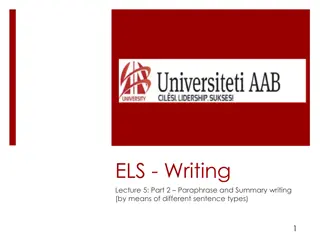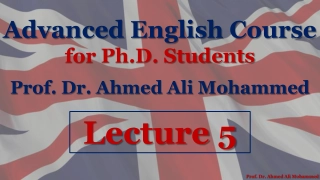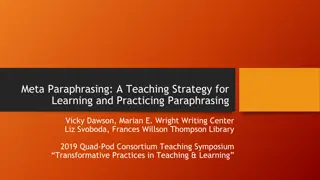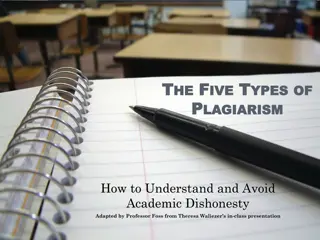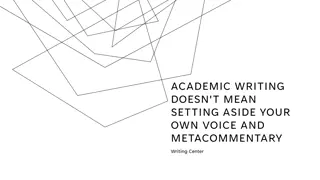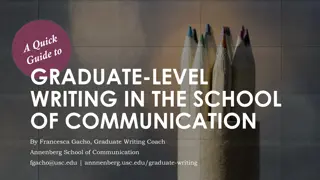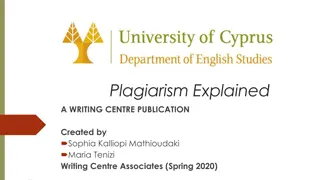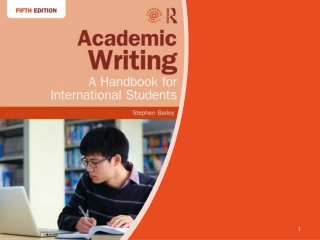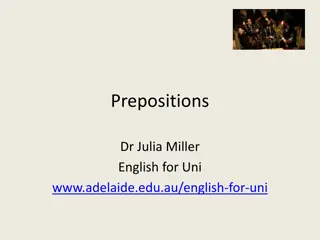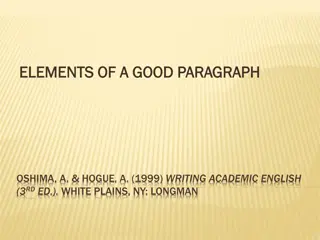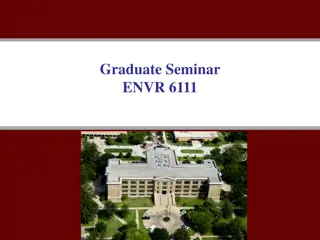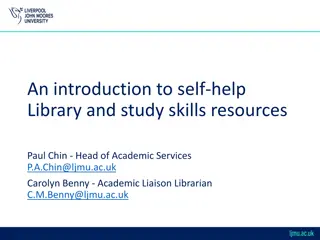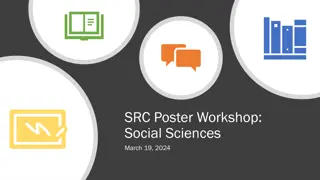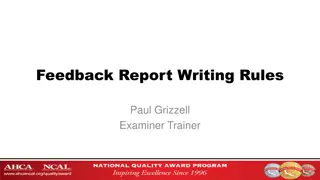Mastering Quoting, Paraphrasing, and Summarizing Skills in Academic Writing
Understanding the importance of quoting, paraphrasing, and summarizing in academic writing, this tutorial explains when and how to use each method effectively. Quoting involves repeating exact words for crucial definitions or evidence, paraphrasing focuses on using your own words to convey understanding, and summarizing condenses main points for an overview. Examples illustrate the proper application of these essential techniques.
Download Presentation

Please find below an Image/Link to download the presentation.
The content on the website is provided AS IS for your information and personal use only. It may not be sold, licensed, or shared on other websites without obtaining consent from the author. Download presentation by click this link. If you encounter any issues during the download, it is possible that the publisher has removed the file from their server.
E N D
Presentation Transcript
Quoting, paraphrasing and summarising www.kent.ac.uk/student-learning-advisory-service
Using the work of others Using the work of others Essential part of academic writing No copying/pasting Instead: quoting paraphrasing summarising
Quoting Quoting paraphrasing paraphrasing summarising summarising By the end of this tutorial you will be able to understand when / why / how to quote, paraphrase or summarise
Quoting is Quoting is repeating the exact words When? When the exact wording matters (e.g. a definition) Why? As evidence, to illustrate a point How? Marked out by quotation marks Accompanied by an acknowledgement/reference Note: Needs to fit grammatically .
Paraphrasing is Paraphrasing is using your own words When? When content matters more than word choice (e.g. an analysis or insight) Why? As evidence, to demonstrate understanding How Rewording and restructuring the original Accompanied by an acknowledgement/reference
Summarising is Summarising is condensing in your own words When? When main points matter more than details (e.g. background information) Why? As evidence, to give an overview or context How Rewording, shortening the original Accompanied by an acknowledgement/reference
Successful cultural quarters very often have quite deliberately set out to develop a network of communication venues, and in some cases these have been planted as strategic elements in the wider development of an area. development of an area. Successful cultural quarters very often have quite deliberately set out to develop a network of communication venues, and in some cases these have been planted as strategic elements in the wider Quote (footnote style): Montgomery points out that many popular cultural quarters very often have quite deliberately set out to develop a network of communication venues . Quote (author-date style): Montgomery points out that many successful of the cultural quarters very often have quite deliberately set out to develop a network of communication venues (Montgomery 2003, p.294). John Montgomery. Cultural Quarters as Mechanisms for Urban Regeneration. Part 1: Conceptualising Cultural Quarters, Planning Practice & Research, 18:4, (2003) 293-306, (294) 7
Successful cultural quarters very often have quite deliberately set out to develop a network of communication venues, and in some cases these have been planted as strategic elements in the wider development of an area. Paraphrase (footnote style): Montgomery points out that frequently cultural quarters have not developed spontaneously but have been purposefully designed to encourage creative exchanges. Paraphrase (author-date style) Montgomery (2013) points out that frequently cultural quarters have not developed spontaneously but have been purposefully designed to encourage creative exchanges. John Montgomery. Cultural Quarters as Mechanisms for Urban Regeneration. Part 1: Conceptualising Cultural Quarters, Planning Practice & Research, 18:4, (2003) 293-306, (294) 8
Successful cultural quarters very often have quite deliberately set out to develop a network of communication venues, and in some cases these have been planted as strategic elements in the wider development of an area. Paraphrase (footnote style): Frequently cultural quarters have not developed spontaneously but have been purposefully designed to encourage creative exchanges. Paraphrase (author-date style) Frequently cultural quarters have not developed spontaneously but have been purposefully designed to encourage creative exchanges (Montgomery, 2013). John Montgomery. Cultural Quarters as Mechanisms for Urban Regeneration. Part 1: Conceptualising Cultural Quarters, Planning Practice & Research, 18:4, (2003) 293-306, (294) 9
Paraphrasing Paraphrasing - - doing it right doing it right Cultural quarters cannot exist without cultural activity and of special significance is the presence of venues. Changing some words: Cultural quarters cannot happen without cultural action and of special significance is the presence of venues. Words and structure too similar Changing most words: Cultural quarters will not happen without artistic action and of distinct importance is the existence of venues. Structure too similar Same meaning - different structure & words Changing words and structure: Venues are of particular importance as without cultural or artistic activity there are no cultural quarters.
Paraphrasing Paraphrasing techniques techniques Move last idea/item to front Use larger chunks of text Break up or join sentences Exchange words e.g. venue site or location Change word category e.g. exist (verb) - existence (noun) Does it still say/mean the same?
Cultural quarters cannot exist without cultural activity and of special significance is the presence of venues. These should be as varied as possible, preferably at the small and medium scale where the objective is to encourage a more active street life. As well as performance venues, there should also be rehearsal and practice spaces. A mixed economy in venues helps generate self-sustaining growth, so that as well as publicly provided theatres and galleries there should also be private galleries and performance venues. It is important that as many venues as possible should remain open in the evenings as well as during the day. Successful cultural quarters very often have quite deliberately set out to develop a network of communication venues, and in some cases these have been planted as strategic elements in the wider development of an area. In order to sustain a living culture, it is important for at least some cultural organisations to be producing houses (i.e. making new work) rather than having an over-reliance on touring products. The presence of producing companies in any cultural quarter adds weight and, often, extra quality. 185 words Summary (author-date style) Montgomery (2103) highlights the importance of variety for a cultural quarter to succeed, and recommends that there should be performing and producing activity around the clock. 26 words
Quoting Quoting paraphrasing paraphrasing summarising summarising You should now have a better understanding of When, why and how to quote, paraphrase or summarise Note: Every time you use or reproduce the work of others (e.g. their words, ideas, data, images, etc.) you need to include an acknowledgement.
Get in touch Get in touch SLAS CONNECT To book an appointment: www.kent.ac.uk/student-learning-advisory-service learning@kent.ac.uk SLASkent KentUniSLAS SLASkent


